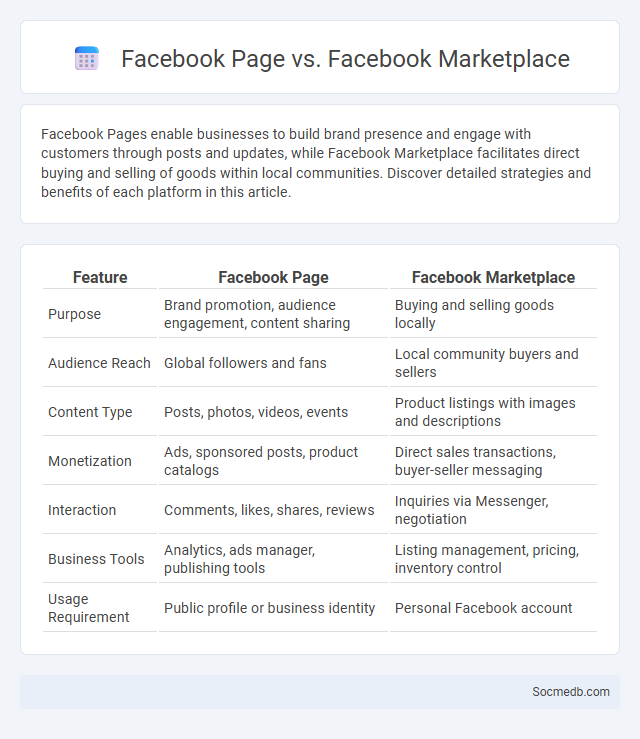
Photo illustration: Facebook Page vs Facebook Marketplace
Facebook Pages enable businesses to build brand presence and engage with customers through posts and updates, while Facebook Marketplace facilitates direct buying and selling of goods within local communities. Discover detailed strategies and benefits of each platform in this article.
Table of Comparison
| Feature | Facebook Page | Facebook Marketplace |
|---|---|---|
| Purpose | Brand promotion, audience engagement, content sharing | Buying and selling goods locally |
| Audience Reach | Global followers and fans | Local community buyers and sellers |
| Content Type | Posts, photos, videos, events | Product listings with images and descriptions |
| Monetization | Ads, sponsored posts, product catalogs | Direct sales transactions, buyer-seller messaging |
| Interaction | Comments, likes, shares, reviews | Inquiries via Messenger, negotiation |
| Business Tools | Analytics, ads manager, publishing tools | Listing management, pricing, inventory control |
| Usage Requirement | Public profile or business identity | Personal Facebook account |
Introduction to Facebook Page and Marketplace
Facebook Page allows Your business or personal brand to establish an online presence, engaging with a targeted audience through posts, events, and messaging features. The Facebook Marketplace provides a platform for buying and selling products locally, enhancing your reach to nearby customers. Both tools integrate seamlessly, boosting visibility and driving community interaction on the world's largest social network.
Understanding Facebook Page Features
Facebook Pages offer businesses and creators a platform to engage with their audience through features like customizable tabs, insights on audience demographics, and targeted advertising tools. The Page Insights function provides detailed analytics on user interactions, reach, and post performance, helping optimize content strategy. Utilizing Messenger integration and call-to-action buttons enhances customer communication and drives conversions effectively.
What is Facebook Marketplace?
Facebook Marketplace is an online platform integrated within Facebook that allows users to buy and sell items locally. You can find a wide range of products from electronics and furniture to clothing and vehicles, facilitating direct communication between buyers and sellers. This service leverages Facebook's extensive user base to provide a convenient, trusted marketplace experience.
Key Differences: Facebook Page vs Marketplace
Facebook Page is designed for businesses and brands to create a public presence, share updates, engage with followers, and build community through posts, events, and messages. Facebook Marketplace is a platform for buying and selling goods locally, enabling users to list items, browse categories, and connect with buyers or sellers directly. Understanding these key differences helps you optimize your strategy by leveraging a Facebook Page for brand awareness and Marketplace for direct commerce.
Audience Targeting on Facebook Page vs Marketplace
Facebook Page audience targeting leverages detailed demographic and interest data to engage specific user groups through tailored posts and ads, enhancing brand loyalty and interaction. Marketplace targeting focuses on location and purchasing intent, connecting sellers with nearby buyers actively searching for products or services. Your marketing strategy should align with either precise community building on Pages or transactional reach in Marketplace to maximize conversion.
Selling Products: Page vs Marketplace
Selling products on a dedicated social media page allows you to create a branded environment tailored to your target audience, enhancing customer engagement and trust. In contrast, marketplaces on platforms like Facebook or Instagram provide broader exposure to diverse buyers, increasing product visibility but often at the cost of less personalized interaction. Your choice depends on whether you prioritize brand building through direct communication or rapid sales driven by high traffic volumes.
Marketing Strategies for Pages and Marketplace
Social media marketing strategies for pages and marketplaces focus on targeted content creation, audience segmentation, and analytics-driven optimization to maximize engagement and conversion rates. Utilizing platform-specific tools such as Facebook Ads Manager and Instagram Shopping can enhance product visibility and streamline your sales funnel. You can boost brand awareness and increase ROI by leveraging user-generated content and influencer partnerships tailored to your market niche.
Pros and Cons: Facebook Page vs Marketplace
Facebook Pages offer businesses a dedicated platform for brand building, customer engagement, and content sharing, enhancing visibility through targeted advertising and analytics tools. Facebook Marketplace facilitates direct buying and selling within local communities, providing a convenient, cost-effective way to reach nearby customers without the need for a formal store setup. While Pages require ongoing content management and may involve advertising costs, Marketplace has limited branding capabilities and increased competition, impacting control over customer experience and pricing.
Best Use Cases for Pages and Marketplace
Social media pages excel in brand building, community engagement, and targeted advertising, enabling businesses to foster customer loyalty and increase visibility. Marketplace platforms offer seamless peer-to-peer selling, product discovery, and localized commerce opportunities, making them ideal for small businesses and individual sellers. Leveraging pages for consistent content and marketplaces for transactional interactions maximizes reach and revenue potential.
Choosing the Right Platform for Your Business
Selecting the appropriate social media platform significantly impacts your business's reach and engagement. Analyzing your target audience's demographics helps tailor content on platforms like Instagram for younger users or LinkedIn for professionals. By matching your business goals with platform strengths, you maximize your marketing efficiency and ROI.
 socmedb.com
socmedb.com